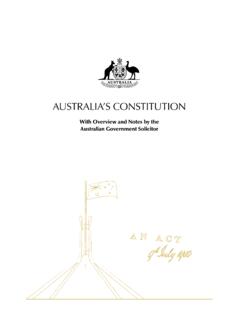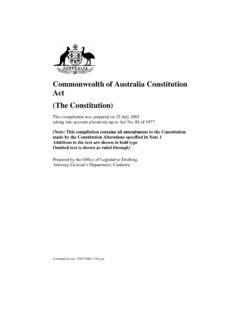Transcription of Fourth Amendment to the United States Constitution
1 Fourth Amendment to the United States Constitution1 Fourth Amendment to the United StatesConstitutionUnited States of AmericaThis article is part of the series: United States ConstitutionPreamble and Articlesof the ConstitutionPreamble I II III IV V VI VIIA mendments to the ConstitutionRatified AmendmentsThe first ten Amendments are collectively known as the Bill of RightsFourth Amendment to the United States Constitution2 I II III IV V VI VII VIII IX X XI XII XIII XIV XV XVI XVII XVIII XIX XX XXI XXII XXIII XXIV XXV XXVI XXVIIU nratified Amendments I(a) XIII(a) XIII(b) XX(a) XXVII(a) XXVII(b)Full text of the Constitutionand Amendments Preamble & Articles I-VII Amendments I-X Amendments XI-XXVII Unratified AmendmentsUS Government PortalLaw PortalConstitutions of States in the UnionConstitutions of other countries view talk edit [1] Fourth Amendment to the United States Constitution3 The Bill of Rights in the National ArchivesThe Fourth Amendment ( Amendment IV)
2 To the United StatesConstitution is the part of the Bill of Rights that prohibitsunreasonable searches and seizures and requires any warrant to bejudicially sanctioned and supported by probable cause. It wasadopted in response to the abuse of the writ of assistance, a type ofgeneral search warrant issued by the british government and a majorsource of tension in pre-Revolutionary America. The FourthAmendment was introduced in Congress in 1789 by James Madison,along with the other amendments in the Bill of Rights, in response toAnti-Federalist objections to the new Constitution . Congresssubmitted the Amendment to the States on September 28, 1789. ByDecember 15, 1791, the necessary three-quarters of the States hadratified it. On March 1, 1792, Secretary of State Thomas Jeffersonannounced the adoption of the the Bill of Rights did not initially apply to the States , and federal criminal investigations were less commonin the first century of the nation's history, there is little significant case law for the Fourth Amendment before the20th century.
3 The Amendment was held to apply to the States in Mapp v. Ohio (1961).Under the Fourth Amendment , search and seizure (including arrest) should be limited in scope according to specificinformation supplied to the issuing court, usually by a law enforcement officer who has sworn by it. FourthAmendment case law deals with three central questions: what government activities constitute "search" and"seizure"; what constitutes probable cause for these actions; and how violations of Fourth Amendment rights shouldbe addressed. Early court decisions limited the Amendment 's scope to a law enforcement officer's physical intrusiononto private property, but with Katz v. United States (1967), the Supreme Court held that its protections, such as thewarrant requirement, extend to the privacy of individuals as well as physical locations.
4 Law enforcement officersneed a warrant for most search and seizure activities, but the Court has defined a series of exceptions for consentsearches, motor vehicle searches, evidence in plain view, exigent circumstances, border searches, and exclusionary rule is one way the Amendment is enforced. Established in Weeks v. United States (1914), this ruleholds that evidence obtained through a Fourth Amendment violation is generally inadmissible at criminal discovered as a later result of an illegal search may also be inadmissible as "fruit of the poisonous tree,"unless it inevitably would have been discovered by legal Amendment to the United States Constitution4 TextThe right of the people to be secure in their persons, houses, papers, and effects, against unreasonablesearches and seizures, shall not be violated, and no Warrants shall issue, but upon probable cause,supported by Oath or affirmation, and particularly describing the place to be searched, and the personsor things to be seized.
5 [2]BackgroundEnglish lawCharles Pratt, 1st Earl Camden established theEnglish common law precedent against generalsearch many other areas of American law, the Fourth Amendment findsits roots in English legal doctrine. Sir Edward Coke, in Semayne's case(1604), famously stated: "The house of every one is to him as his castleand fortress, as well for his defence against injury and violence as forhis repose."[3] Semayne's Case acknowledged that the King did nothave unbridled authority to intrude on his subjects' dwellings butrecognized that government agents were permitted to conduct searchesand seizures under certain conditions when their purpose was lawfuland a warrant had been obtained.[4]The 1760s saw a growth in the intensity of litigation against stateofficers, who, using general warrants, conducted raids in search ofmaterials relating to John Wilkes's publications attacking bothgovernment policies and the King himself.
6 The most famous of thesecases involved John Entick, whose home was forcibly entered by theKing's Messenger Nathan Carrington, along with others, pursuant to awarrant issued by George Montagu-Dunk, 2nd Earl of Halifaxauthorizing them to make strict and diligent search for .. the author,or one concerned in the writing of several weekly very seditious papers intitled, The Monitor or british Freeholder,No 257, 357, 358, 360, 373, 376, 378, and 380, and seized printed charts, pamphlets and other materials. Entickfiled suit in Entick v Carrington, argued before the Court of King's Bench in 1765. Charles Pratt, 1st Earl Camdenruled that both the search and the seizure was unlawful, as the warrant authorized the seizure of all of Entick'spapers not just the criminal ones and as the warrant lacked probable cause to even justify the search.
7 By holdingthat "[O]ur law holds the property of every man so sacred, that no man can set his foot upon his neighbour's closewithout his leave",[5] Entick established the English precedent that the executive is limited in intruding on privateproperty by common United StatesHomes in the Colonial United States , on the other hand, did not enjoy the same sanctity as their british counterparts,because legislation had been explicitly written so as to enable enforcement of british revenue-gathering policies oncustoms; until 1750, in fact, the only type of warrant defined in the handbooks for justices of the peace was thegeneral warrant. During what scholar William Cuddihy called the "colonial epidemic of general searches", theauthorities possessed almost unlimited power to search for anything at any time, with very little oversight.
8 [6] Fourth Amendment to the United States Constitution5 Massachusetts lawyer James Otisprotested british use of generalwarrants in the American 1756, the colony of Massachusetts enacted legislation that barred the use ofgeneral warrants. This represented the first law in American history curtailing theuse of seizure power. Its creation largely stemmed from the great public outcryover the Excise Act of 1754, which gave tax collectors unlimited powers tointerrogate colonists concerning their use of goods subject to customs. The actalso permitted the use of a general warrant known as a writ of assistance,allowing tax collectors to search the homes of colonists and seize "prohibited anduncustomed" goods.[7]A crisis erupted over the writs of assistance on December 27, 1760 when thenews of King George II's death on October 23 arrived in Boston.
9 All writsautomatically expired six months after the death of the King and would have hadto be re-issued by King George III, the new king, to remain valid.[8]In mid-January 1761, a group of over 50 merchants represented by James Otispetitioned the court to have hearings on the issue. During the five-hour hearingon February 23, 1761, Otis vehemently denounced british colonial policies, including their sanction of generalwarrants and writs of assistance.[9] Future US President John Adams, who was present in the courtroom when Otisspoke, viewed these events as "the spark in which originated the American Revolution. [10] However, the court ruledagainst Otis.[11]Because of the name he had made for himself in attacking the writs, Otis was elected to the Massachusetts coloniallegislature and helped pass legislation requiring that special writs of assistance be "granted by any judge or justice ofthe peace upon information under oath by any officer of the customs" and barring all other writs.
10 The governoroverturned the legislation, finding it contrary to English law and parliamentary sovereignty.[12]Seeing the danger general warrants presented, the Virginia Declaration of Rights (1776) explicitly forbade the use ofgeneral warrants. This prohibition became a precedent for the Fourth Amendment :[13]That general warrants, whereby any officer or messenger may be commanded to search suspected placeswithout evidence of a fact committed, or to seize any person or persons not named, or whose offense isnot particularly described and supported by evidence, are grievous and oppressive and ought not to XIV of the Massachusetts Declaration of Rights, written by John Adams and enacted in 1780 as part of theMassachusetts Constitution , added the requirement that all searches must be "reasonable" and served as another basisfor the language of the Fourth Amendment :Every subject has a right to be secure from all unreasonable searches, and seizures of his person, hishouses, his papers, and all his possessions.













